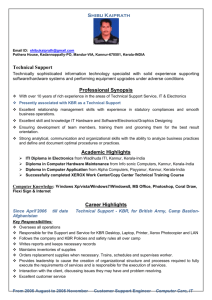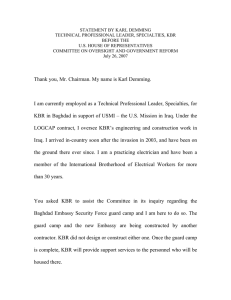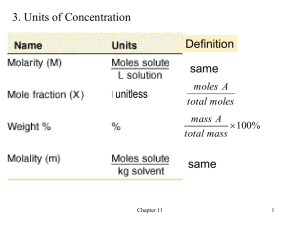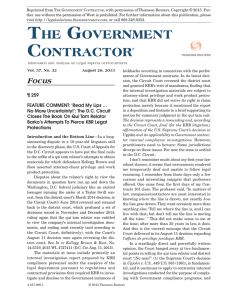STATEMENT BY GEORGE SEAGLE DIRECTOR OF SECURITY,
advertisement
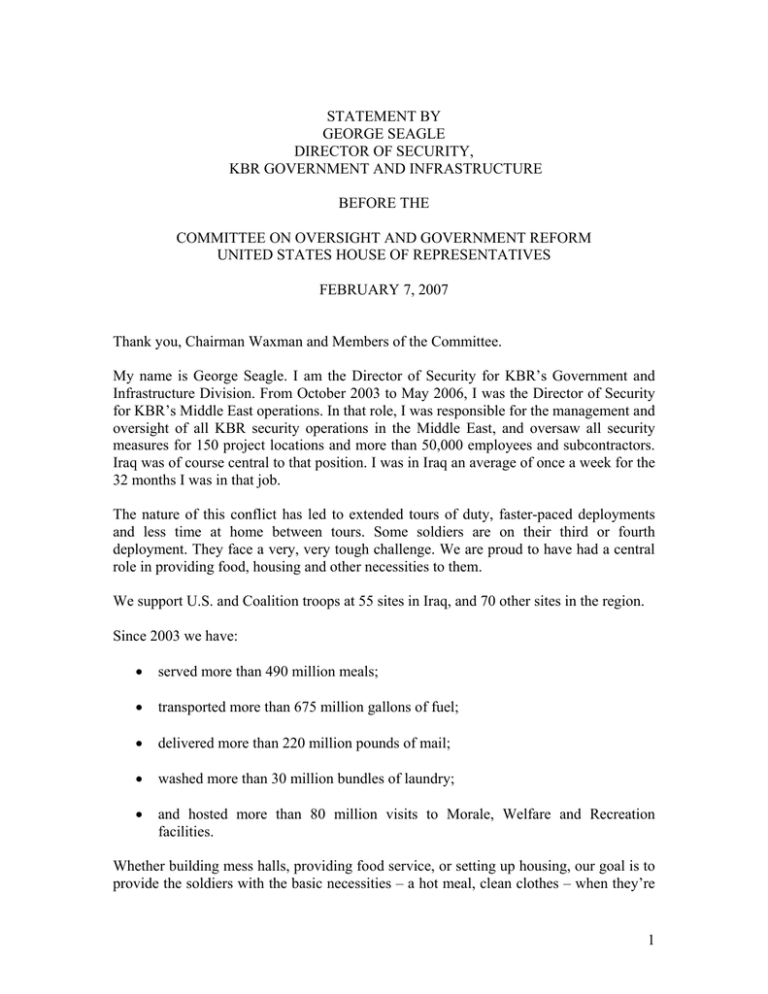
STATEMENT BY GEORGE SEAGLE DIRECTOR OF SECURITY, KBR GOVERNMENT AND INFRASTRUCTURE BEFORE THE COMMITTEE ON OVERSIGHT AND GOVERNMENT REFORM UNITED STATES HOUSE OF REPRESENTATIVES FEBRUARY 7, 2007 Thank you, Chairman Waxman and Members of the Committee. My name is George Seagle. I am the Director of Security for KBR’s Government and Infrastructure Division. From October 2003 to May 2006, I was the Director of Security for KBR’s Middle East operations. In that role, I was responsible for the management and oversight of all KBR security operations in the Middle East, and oversaw all security measures for 150 project locations and more than 50,000 employees and subcontractors. Iraq was of course central to that position. I was in Iraq an average of once a week for the 32 months I was in that job. The nature of this conflict has led to extended tours of duty, faster-paced deployments and less time at home between tours. Some soldiers are on their third or fourth deployment. They face a very, very tough challenge. We are proud to have had a central role in providing food, housing and other necessities to them. We support U.S. and Coalition troops at 55 sites in Iraq, and 70 other sites in the region. Since 2003 we have: • served more than 490 million meals; • transported more than 675 million gallons of fuel; • delivered more than 220 million pounds of mail; • washed more than 30 million bundles of laundry; • and hosted more than 80 million visits to Morale, Welfare and Recreation facilities. Whether building mess halls, providing food service, or setting up housing, our goal is to provide the soldiers with the basic necessities – a hot meal, clean clothes – when they’re 1 back on base, returning from dangerous missions. The feedback we have received from our military and the troops on the ground has been overwhelmingly positive, and we are proud of the work of our courageous employees. Like me, many of my KBR colleagues served in the military. We understand the importance of our work to support the brave men and women of our military. When I was graduating from high school and was offered a college football scholarship, I chose, instead, to follow in my father’s footsteps and become a Marine. I can proudly say that my son followed me and also joined the Corps. I was an active Marine for more than 26 years and retired at the highest Warrant Officer rank in the Marines. I was a Security Guard Detachment Commander in both Europe and the Middle East and also served in a variety of aviation maintenance positions. My career culminated with nearly three-and-ahalf years as a White House Liaison Officer for Marine Helicopter Squadron One, which includes Marine One, securely transporting both Presidents Bill Clinton and George W. Bush. I joined KBR in late 2002 as site security manager for its construction of the new U.S. embassy compound in Kabul, Afghanistan. Sadly, my first visit to Iraq in August 2003 was a direct result of the first KBR employee killed there in hostile action. Along with four other security experts, I traveled throughout Iraq to carry out a comprehensive review of KBR’s security measures. Due to the deteriorating security situation, we recommended key enhancements to company security procedures, oversight and management. I understand a focus of today’s hearing is on the use of private security contractors in Iraq. To my knowledge, every foreign company working in Iraq uses private security in one capacity or another. KBR uses private security on our non-LOGCAP work. And in certain circumstances, our LOGCAP subcontractors did as well. Military security was not guaranteed for all of the work the company did in the region. And traveling without security is exceptionally dangerous. Since 2003, there have been approximately 400 injuries and fatalities to KBR employees and subcontractors due to hostile acts. More than 180 of those injuries and fatalities were due to Improvised Explosive Devices or IEDs. One-hundred-twenty-three of them were from attacks by mortars, artillery and rockets. Seventy-two were from small arms fire. Still others resulted from objects thrown at convoys, criminal assaults and kidnapping. To date, we have lost 97 people in Iraq, Kuwait and Afghanistan. Overall more than 400 civilian workers have been killed in Iraq and nearly 4,000 injured. These are the realities our employees and subcontractors face every day. The changes in the security landscape have been dramatic. When I first went to Iraq in 2003, we drove regular passenger vehicles from location to location, with no security and no fear. But that situation soon changed. Small arms fire attacks increased, and our people became frequent targets when off base. The enemy used increasingly sophisticated 2 IEDs and, later, at checkpoints and in crowds, the even more lethal vehicle borne IEDs. Rocket-propelled grenades, land mines and mortars are additional constant threats. The attacks are not limited to the roads. Even being on base can be dangerous – with regular mortar and rocket attacks. And at Christmastime in 2004, a suicide bomber blew himself up during lunchtime in a KBR-run dining facility, killing 13 troops, four of our employees and three subcontractors. Amid all those challenges, in such dangerous conditions, KBR operates a fleet of trucks that transports military fuel, military parts, medicine, hospital supplies, food and mail to Coalition forces. So far, they have logged more than 100 million miles with more than 700 trucks on the road on any given day. We continue to provide the troops with meals, services and living quarters. Our top priority must be our mission: providing the troops with what they need in a war zone. While our mission to support the troops has always been clear, executing the details of that mission has required extreme flexibility. In 2003, KBR was initially directed by the Army to plan to support between 25,000 and 50,000 troops. The scope and nature of our task changed dramatically. This is not a criticism; ever-changing priorities are a reality of war. And the reality was that our mission grew to supporting more than 185,000 troops. Naturally, with a dramatic change in the scope of services to be provided, all within a war zone, KBR encountered significant challenges. KBR first encountered difficulties in mounting such a large enterprise in a hostile environment. As with any endeavor of this size, magnitude and challenge there have been times when our company, and those that we work with, have made mistakes. A handful of our 50,000 individuals on the ground have acted improperly. But while the rapid growth of our assignment and the constant change taxed our systems, we adapted and developed systems that work. When we had questions about the actions of certain individuals, we investigated and reported them to the Army. For more than 60 years, KBR has undertaken demanding assignments in dangerous regions to support the U.S. military. I speak for everyone in our company when I say we are extremely proud to support the courageous men and women of our armed forces. With each meal we serve, we try to bring them some small sense of the comforts of home. And when a soldier does have a few extra hours, the fitness centers we run and the activities we host at our morale, welfare and recreation facilities offer a brief refuge from the strain of combat. As the Congress continues its oversight of the war effort and contracting, I want to assure you that we are fully committed to cooperating with the Congress as it fulfills its oversight responsibilities. As a government contractor, we take very seriously our responsibility to assist in the proper oversight of our work. Mr. Chairman and Members of the Committee, I look forward to your questions and will do my best to provide you with the information you need. Thank you. 3
